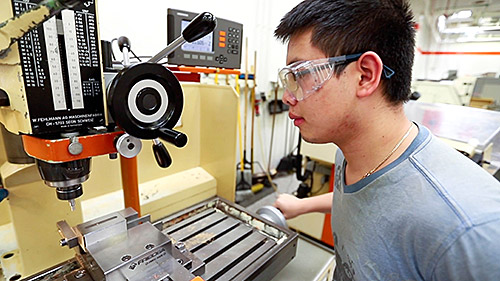Apprenticeships are an important tool for recruiting and retaining talent, especially as jobs become more technical and specialized. Through apprenticeships, companies can ensure they have a steady supply of highly qualified employees, with all the skills they need to do increasingly advanced jobs. With a focus on advanced manufacturing and automation, apprenticeships are also an excellent way to stay current on the new technologies that give companies a competitive edge in the marketplace.
In addition, “apprenticeships create more loyal employees who stay with the business, often for their entire careers,” notes Sven Gerzer, vice president of Economic Development for Europe, India and North America for the Charlotte Regional Business Alliance, a regional EDO centered on Charlotte that includes 15 surrounding counties. “For the Charlotte region, apprenticeships are crucial for workforce development and economic development,” Gerzer adds.
Collaboration Is the Key
Apprenticeships require collaboration among businesses, economic development groups and educational institutions. These efforts create good jobs that fit the needs of the local industries. Companies are highly concerned about the looming skills gap and want to be proactive by building their own pipelines of skilled workers. This boosts employee retention and saves money on wages — for instance, through an apprenticeship, companies can train an individual at 50 percent of the journeyman’s wage and end the apprenticeship at 85 percent of that same wage.
Apprenticeships provide a mix of classroom and on-the-job training, customized to each company’s requirements. Most programs consist of an employer and student agreement. In North Carolina, formal or registered apprenticeships are created in agreement with the North Carolina Department of Commerce (NCDOC). Participating colleges help determine the recruitment process, coordination of NCDOC activities and agreement processes, and required and elective course work for certificates, diplomas, or degrees.
Apprenticeships create more loyal employees who stay with the business, often for their entire careers. Sven Gerzer, Vice President, Economic Development for Europe, India and North America For example, Apprenticeship Catawba is a partnership among local businesses, the public school systems, Apprenticeship NC, and Catawba Valley Community College. Launched in 2014, Apprenticeship Catawba is a four-year program that focuses on mechatronics and computer-integrated machining. Representatives work closely with high-school career counselors to identify possible candidates for apprenticeship programs. Students are selected as juniors or seniors in high school and continue their education at Catawba Valley Community College. Apprentices graduate from the program with journeyman certification, an associate degree and guaranteed full-time employment.
“Recruiting high-school students is a way to ensure we fill our talent pipeline in key industries — not just advanced manufacturing, but also information technology, financial services, health care and supply chain/logistics,” says Rod Garvin, vice president of Talent and Workforce Development for the Charlotte Regional Business Alliance. “These ‘learn-and-earn’ opportunities also help place more young people on a path to economic opportunity and mobility, a top priority for our communities,” explains Garvin.
Furthermore, local economic development organizations utilize apprenticeships when recruiting new companies to the local area. “Industries request apprenticeship programs in our area after they realize how successful these programs have been for recruiting and retaining top employees,” says Kimberly Propst, apprenticeship coordinator for Catawba Valley Community College.

Another program, Apprenticeship 2000, has been a top-producing program for nearly two decades. Based on a world-renown German system, it is the only one in the U.S. that is certified by the IHK Karlsruhe (Chamber of Commerce of Karlsruhe).
Started in 1995 in the Charlotte region, Apprenticeship 2000 was established to provide technical career opportunities for motivated high school students and employment after their graduation. The 8,000-hour training program at Central Piedmont Community College (CPCC) produces highly skilled employees for advanced manufacturing positions such as computer numerical control (CNC) machinist, tool and die maker, mechatronics and injection-molding technician. For example, Cummins, a global manufacturer of diesel and natural gas engines, partners with CPCC to produce apprentices who are experts at building and maintaining Cummins diesel engines. In fact, Cummins is so pleased with the program it sends all its apprentices from North America and the Caribbean to CPCC for training.
Apprenticeship 2000 and other apprenticeship systems are highly effective in recruiting both European and domestic companies to the Charlotte region. “Our German-style apprenticeship systems are usually the number-one reason a company relocates here from Europe,” says Gerzer. “These systems also attract domestic companies that are interested in maintaining a highly qualified and loyal workforce. As a result, we have been highly successful in recruiting new companies — both domestic and international — into our communities.”
Recruiting high-school students is a way to ensure we fill our talent pipeline in key industries — not just advanced manufacturing, but also information technology, financial services, health care and supply chain/logistics. Rod Garvin, Vice President, Talent and Workforce Development, Charlotte Regional Business Alliance In Lincoln County, North Carolina, companies rely on apprenticeship programs at three different community colleges. The programs focus on engineering, mechatronics, robotics, and equipment maintenance and are customized to a company’s workforce needs. “Companies that are interested in locating here always ask for information about our workforce development plans and are impressed by the apprenticeship programs we have available,” says John F. Dancoff, existing business manager for the Lincoln Economic Development Association in Lincolnton.
Garvin is also excited about the recent launch of ROC, a nonprofit organization that recruits, educates and mentors high-school students in the Charlotte area for career and technical education and employment opportunities in the construction industry.
“ROC is the result of a partnership among Goodwill Industries of the Southern Piedmont, Charlotte-Mecklenburg school districts and Central Piedmont Community College,” says Garvin. “The ROC is located in the new Goodwill Construction Skills Training Center and gives students an opportunity to begin training for a career in construction in their junior year of high school, followed by transition into a full-time role after graduating from high school.”
All of these programs reflect the positive role apprenticeships play in both workforce and economic development.




